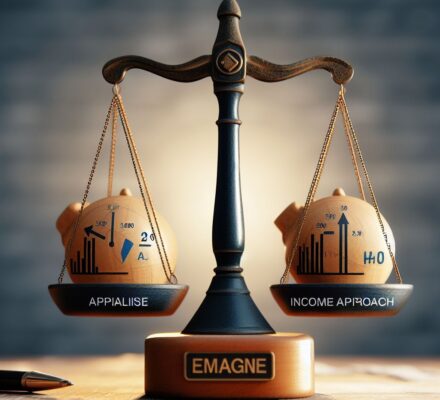Are you curious about the critical role of determining fair market value in 1031 exchanges?
Delve into the depths of this significant subject to unlock the secrets of maximizing tax benefits, ensuring compliance with IRS regulations, and avoiding legal complications.
By embracing strategic exchange planning and enhancing investment opportunities, you can navigate the intricacies of fair market value with confidence.
Prepare to embark on a journey of knowledge, armed with the tools to make informed decisions and achieve your financial goals.
Key Takeaways
- Determining fair market value accurately is crucial in order to maximize tax benefits and comply with IRS regulations in 1031 exchanges.
- Compliance with IRS regulations is essential to avoid legal complications and penalties.
- Strategic exchange planning, including identifying investment objectives and researching potential replacement properties, can enhance the benefits of determining fair market value.
- Determining fair market value allows investors to accurately assess investment worth, identify growth opportunities, and diversify their investment portfolio.
Maximizing Tax Benefits
To maximize your tax benefits in a 1031 exchange, it’s crucial to accurately determine the fair market value of the property. The fair market value is the price that a willing buyer and seller would agree upon in an open market. It serves as the basis for calculating the capital gains tax and depreciation recapture in a 1031 exchange. By accurately determining the fair market value, you can ensure that you’re properly deferring taxes and taking full advantage of the tax benefits offered by this exchange.
When you accurately determine the fair market value of your property, you can increase your tax benefits in several ways. Firstly, it allows you to identify a replacement property of equal or greater value, as required by the IRS regulations. This ensures that you can defer all of your capital gains tax and depreciation recapture. Secondly, by accurately determining the fair market value, you can accurately calculate your adjusted basis in the replacement property. This will help you maximize your depreciation deductions and reduce your taxable income.
Transitioning into the next section about compliance with IRS regulations, accurately determining the fair market value of the property is just one aspect of ensuring compliance.
Compliance With IRS Regulations
You must ensure compliance with IRS regulations when determining the fair market value of the property in a 1031 exchange. The IRS has specific rules and guidelines that must be followed to ensure that the fair market value is accurately determined. Here are four reasons why complying with IRS regulations is important in this process:
- Avoiding Penalties: Failure to comply with IRS regulations can result in penalties and fines. By following the rules, you can avoid unnecessary financial consequences.
- Meeting Requirements for a 1031 Exchange: To qualify for a 1031 exchange, the fair market value of the relinquished property and the replacement property must be determined accurately. By complying with IRS regulations, you can ensure that the exchange meets the requirements.
- Minimizing Audit Risk: Non-compliance with IRS regulations increases the risk of being audited. By accurately determining the fair market value and following the rules, you can minimize the chances of being audited.
- Establishing Legitimacy: Complying with IRS regulations helps establish the legitimacy of the 1031 exchange. By following the rules, you can demonstrate that the exchange was done in accordance with the law.
Avoiding Legal Complications
By ensuring compliance with IRS regulations, you can avoid potential legal complications when determining the fair market value of the property in a 1031 exchange. The fair market value is crucial in these exchanges because it determines the amount of gain that’s deferred. If the fair market value is inaccurately determined, it could lead to underreporting or overreporting of the gain, which may result in penalties and legal issues.
One legal complication that can arise from an inaccurate fair market value determination is an IRS audit. If the IRS suspects that the fair market value was misreported, they may choose to audit your 1031 exchange. An audit can be time-consuming, costly, and can potentially uncover other issues that may have gone unnoticed.
Another legal complication that can arise is the possibility of a legal dispute with the other party involved in the exchange. If the fair market value is disputed, it may lead to disagreements and potential legal action. This can be especially problematic if the other party feels that they were misled or that their interests weren’t adequately protected.
To avoid these legal complications, it’s essential to conduct a thorough analysis and valuation of the property to determine its fair market value accurately. It’s recommended to consult with professionals such as appraisers, real estate agents, or tax advisors who’ve experience in 1031 exchanges. By doing so, you can ensure compliance with IRS regulations and minimize the risk of legal issues.
Strategic Exchange Planning
By carefully strategizing your exchange plan, you can maximize the benefits of determining the fair market value for your 1031 exchange. Strategic exchange planning involves thoughtful considerations and actions that can help you make the most of your exchange. Here are four key factors to consider in your strategic exchange planning:
- Identify your investment objectives: Clearly define your goals and objectives for the exchange. Are you looking to diversify your portfolio, increase cash flow, or acquire properties with potential for appreciation? Understanding your investment objectives will guide your decision-making process.
- Research potential replacement properties: Conduct thorough research on potential replacement properties that meet your investment objectives. Consider factors such as location, market conditions, rental demand, and potential for future growth. This will help you identify properties that align with your investment goals.
- Consider timing: Timing can play a crucial role in the success of your exchange. Evaluate market conditions and economic trends to determine the optimal time to initiate your exchange. Timing your exchange strategically can help you capitalize on favorable market conditions.
- Consult with professionals: Seek guidance from qualified professionals, such as real estate agents, tax advisors, and exchange intermediaries. These experts can provide valuable insights and guidance throughout the exchange process, helping you navigate complex regulations and maximize the benefits of determining fair market value.
Enhancing Investment Opportunities
To enhance your investment opportunities in 1031 exchanges, it is crucial to focus on maximizing the potential for growth and diversification. By carefully determining the fair market value of your properties, you can make informed decisions that will ultimately lead to more profitable investments. Fair market value is the price at which the property would change hands between a willing buyer and a willing seller, neither being under any compulsion to buy or sell, and both having reasonable knowledge of the relevant facts. It is important to have a clear understanding of the fair market value of your properties because it allows you to accurately assess the worth of your investments and identify opportunities for growth. Additionally, understanding fair market value helps you diversify your investment portfolio by allowing you to identify undervalued properties that have the potential for significant appreciation. By diversifying your investments, you can spread your risk and increase your chances of achieving higher returns.
| Importance of Determining Fair Market Value in 1031 Exchanges | |
|---|---|
| Accurate assessment of investment worth | |
| Identification of growth opportunities | |
| Diversification of investment portfolio |
Frequently Asked Questions
What Are the Potential Risks and Challenges Associated With Determining Fair Market Value for 1031 Exchanges?
Determining fair market value for 1031 exchanges can be challenging due to potential risks. Accurate valuation is crucial for successful exchanges. Understanding market trends and using reliable appraisal methods can help mitigate these challenges.
How Can an Investor Ensure They Are Accurately Determining Fair Market Value for Their Property in a 1031 Exchange?
To ensure accurate determination of fair market value for your property in a 1031 exchange, hire a professional appraiser or real estate agent. They will assess market conditions, comparable sales, and property features to provide an unbiased valuation.
Are There Any Specific Guidelines or Criteria Set by the IRS for Determining Fair Market Value in a 1031 Exchange?
The IRS has set specific guidelines and criteria for determining fair market value in a 1031 exchange. It’s important to understand these rules in order to accurately assess the value of your property.
Can Fair Market Value Be Determined by Using Online Valuation Tools or Is a Professional Appraisal Required?
You can use online valuation tools to get an estimate of fair market value, but a professional appraisal is usually required for accuracy and compliance with IRS guidelines in a 1031 exchange.
What Happens if the Fair Market Value of the Replacement Property Is Higher Than the Fair Market Value of the Relinquished Property in a 1031 Exchange?
If the fair market value of the replacement property is higher than the fair market value of the relinquished property in a 1031 exchange, you may have to pay taxes on the difference.




